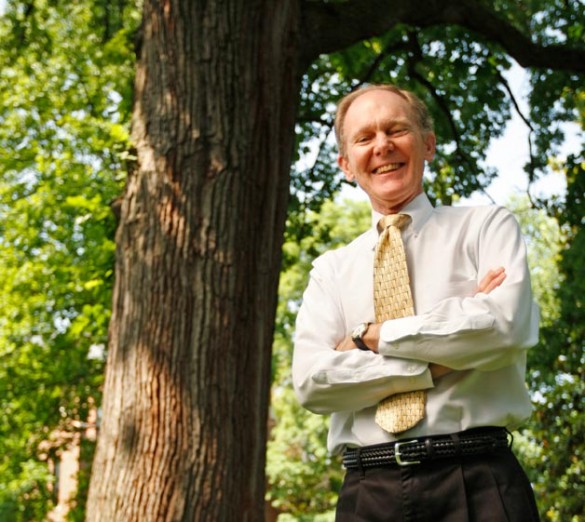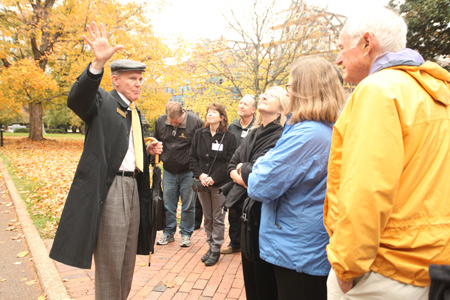
As people around the world commemorated the 50th anniversary of the death of President John F. Kennedy several weeks ago, members of the Vanderbilt community were reminded of the late president’s historic visit to campus in May 1963.
Lyle Lankford, then a Nashville college student, was in the crowd at Dudley Field when Kennedy gave his speech marking the 90th anniversary of the university’s founding. It wouldn’t be Lankford’s last brush with Vanderbilt history.
After 27 years, the last dozen of which he’s served as senior university historian and protocol officer, Lankford will retire from Vanderbilt Dec. 31. His duties in that position have been as interesting and varied as his career itself.
“I started in University Relations in March 1986 as a temporary, as a courier, and learned the campus,” Lankford said. That experience would prove useful several years later when he began leading historical tours of the university.
Hired full-time that September, Lankford performed a variety of tasks within University Relations and in the office of Chancellor Joe B. Wyatt. He began taking on historian duties under the mentorship of John Poindexter, vice chancellor for alumni affairs and conservator of university history, until Poindexter’s retirement in 1993. Lankford joined the Vice Chancellor for Public Affairs’ office when it was formed in 2000, later assuming chief protocol duties from former Director of Commencement Felicity Peck.
Protocol, as it relates to the university, is “knowing how to put your best foot forward,” explained Lankford, who is consulted when dignitaries visit campus, ensures that Vanderbilt’s flags are lowered for official observances, and helps coordinate the responses to formal invitations received by the chancellor from other universities. He also is in charge of coordinating the faculty awards presented at campus ceremonies, including the 25-year faculty chairs, the Chancellor’s Cup and the awarding of emeriti status to retiring faculty at Commencement.
Lankford oversees the conservation of the university’s many portraits, which include historical renderings of Vanderbilt family members, as well as the creation of newer portraits of recent administrators and Board of Trust chairmen. He is responsible for their placement in buildings on the university side of campus.
But by and large, Lankford most relishes the opportunity to conduct research as university historian. Almost weekly, he fields questions from the family members of alumni, who are curious about when a relative attended Vanderbilt and what activities he or she participated in, or who want to check up on the whereabouts of items donated to the university long ago. On request, he researches the history of campus buildings and past events and compiles reports for administrators and staff.
Anyone who has worked with Lankford knows his process is exhaustive and utilizes any number of sources – from published histories of the university and old yearbooks, course catalogs and faculty registries to back issues of the alumni magazine and materials from Vanderbilt’s Special Collections and University Archives. Sometimes his searches take him to the downtown library’s Nashville Room or the Davidson County Archives. Lankford has even been known to contact alumni or their family members to help identify faces in old photographs.
“[rquote]It’s detective work, this historian thing, which to me is what makes it interesting and exciting,” he said. “And when you come up with the answer – that’s very gratifying.”[/rquote]
Favorite research subjects have included the history of the Vanderbilt Aid Society, a women’s group that for 115 years raised money to fund scholarships for worthy Vanderbilt students; and the Old Gym, one of the campus’ earliest buildings, which has served a variety of purposes over the years and is now home to Undergraduate Admissions.
A fascination with Vanderbilt history among people near and far from campus has left Lankford with no shortage of mysteries to track down. It’s a fascination he shares.
“I think there’s something innate within many of us that just wants to know from whence we came,” he said. “This goes all the way back to, ‘How did we get here to begin with?’
“It’s a curiosity that’s within many of us – using our imaginations to determine what went on before we arrived on the scene, which leads us to original sources to see if we can find the answers,” he said.

Lankford was born and raised in Tiptonville, in the far northwest corner of Tennessee, and attended David Lipscomb College in Nashville, where he majored in music and minored in art. He earned a master’s degree in music education at Florida State University.
He returned to Nashville to teach music and English at David Lipscomb High School, then became a founding faculty member at Greater Atlanta Christian School, where for a decade he taught a variety of subjects, including music, art, English, French and theater. A return to Middle Tennessee brought him to Friendship Christian School in Lebanon, where he was the K-12 music and 9-12 art teacher for six years.
Contemplating a career change, Lankford pursued a degree in interior design at Watkins College of Art. At the suggestion of a fellow Watkins student, he applied for a job at Vanderbilt and was hired in 1986.
“My love for history goes all the way back to childhood, to my grandparents,” Lankford said. “I guess I ended up doing what maybe I should have done all along. But I think our lives take turns for reasons. I’ve gotten the best of all my worlds of interest.”
“Lyle’s knowledge of and love for Vanderbilt history is unsurpassed,” said Beth Fortune, vice chancellor for public affairs. “He has served the university with distinction and integrity and is simply a true gentleman. We are going to miss him but wish him the best in his well-earned retirement.”
Lankford’s next big project will be digging into his own history.
“I’m in the process of closing my boyhood home, my parents’ home, in West Tennessee, and I’ve moved more things than I should have from there to here. Some things you just can’t let go of, and other things you have to let go,” he said. “I also have about five large boxes of family photographs to go through and try to identify, so that will be fun. … And my mother was a cook par excellence. She spent a large part of her life in the kitchen. So I have boxes of her recipes that I want to go through.”
Of his many duties, Lankford said he’ll miss the role of historian most. “And I’ll miss the people,” he said. “I’ve enjoyed working with so many people on campus over the years, as well as the folks who call and ask questions. I’ll miss that very much.”